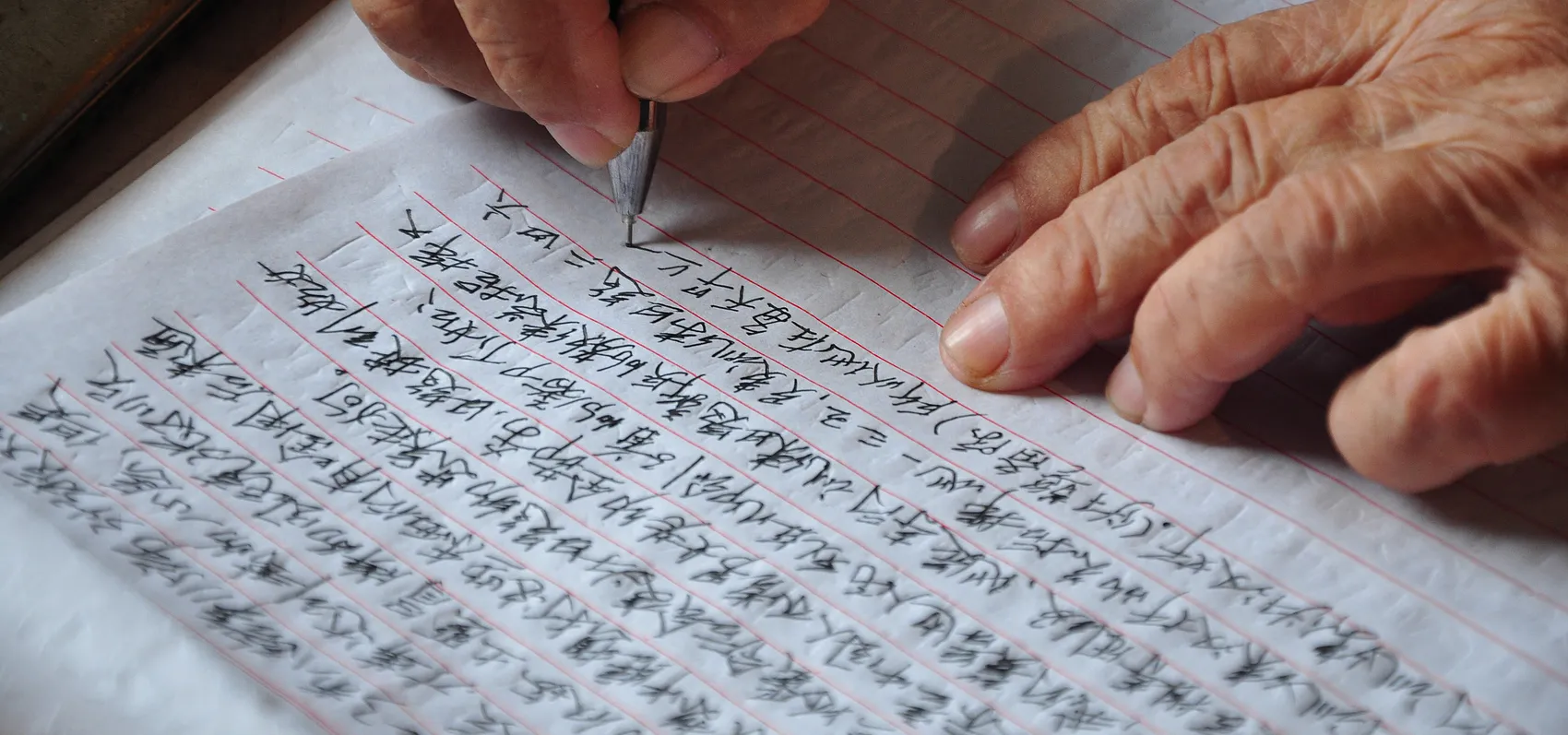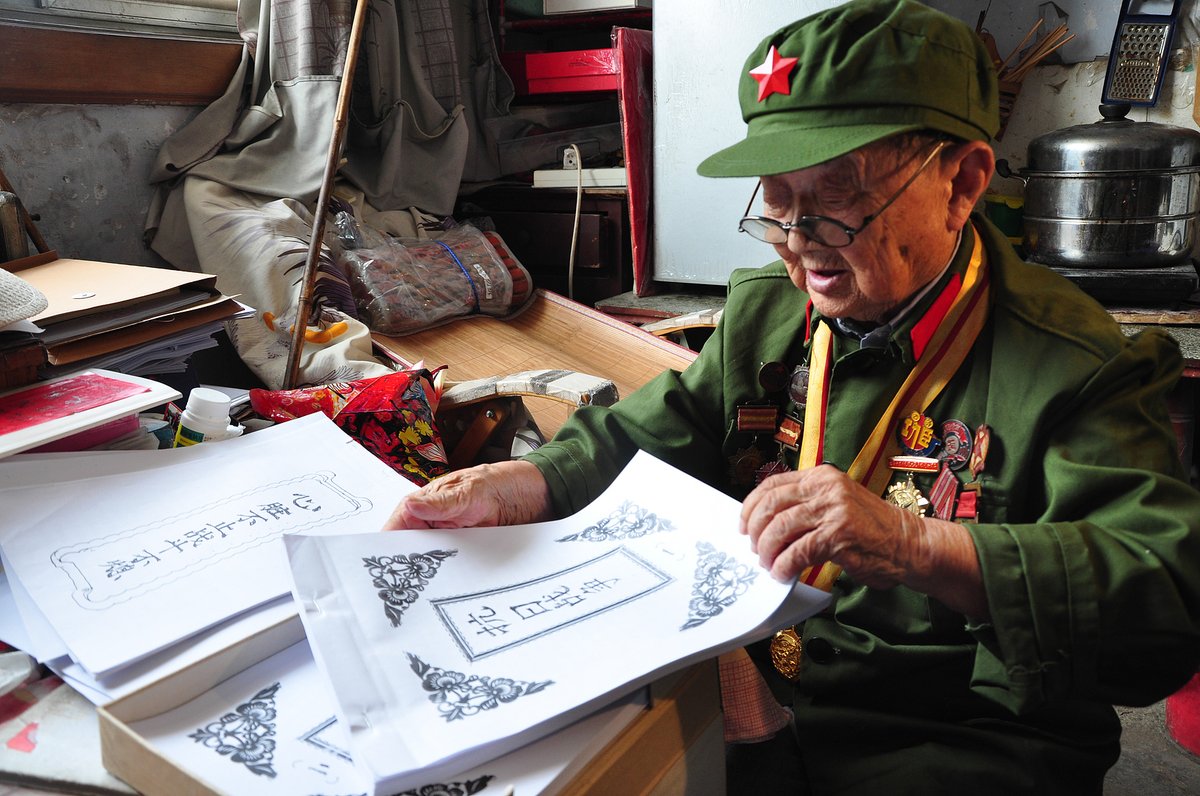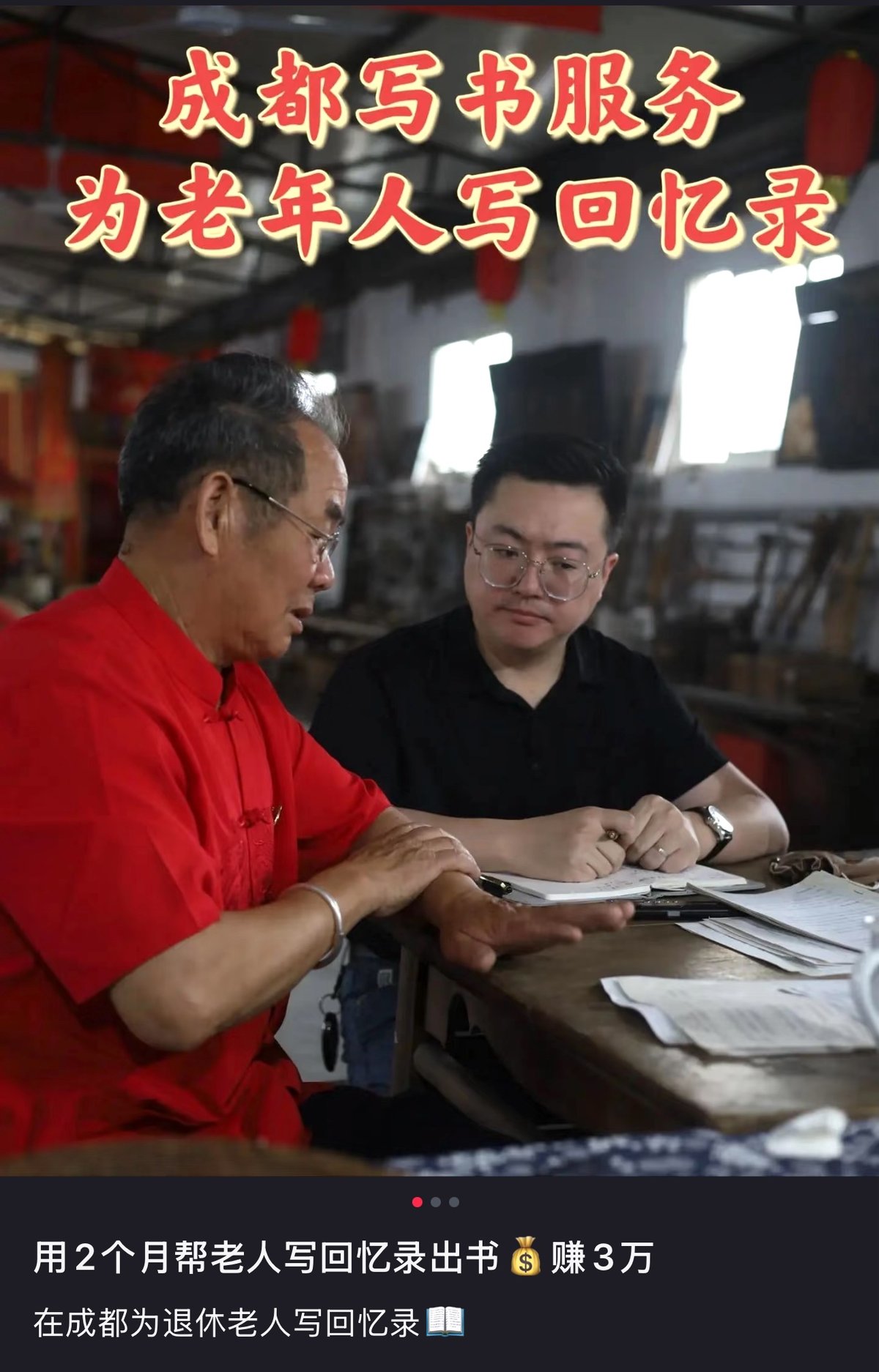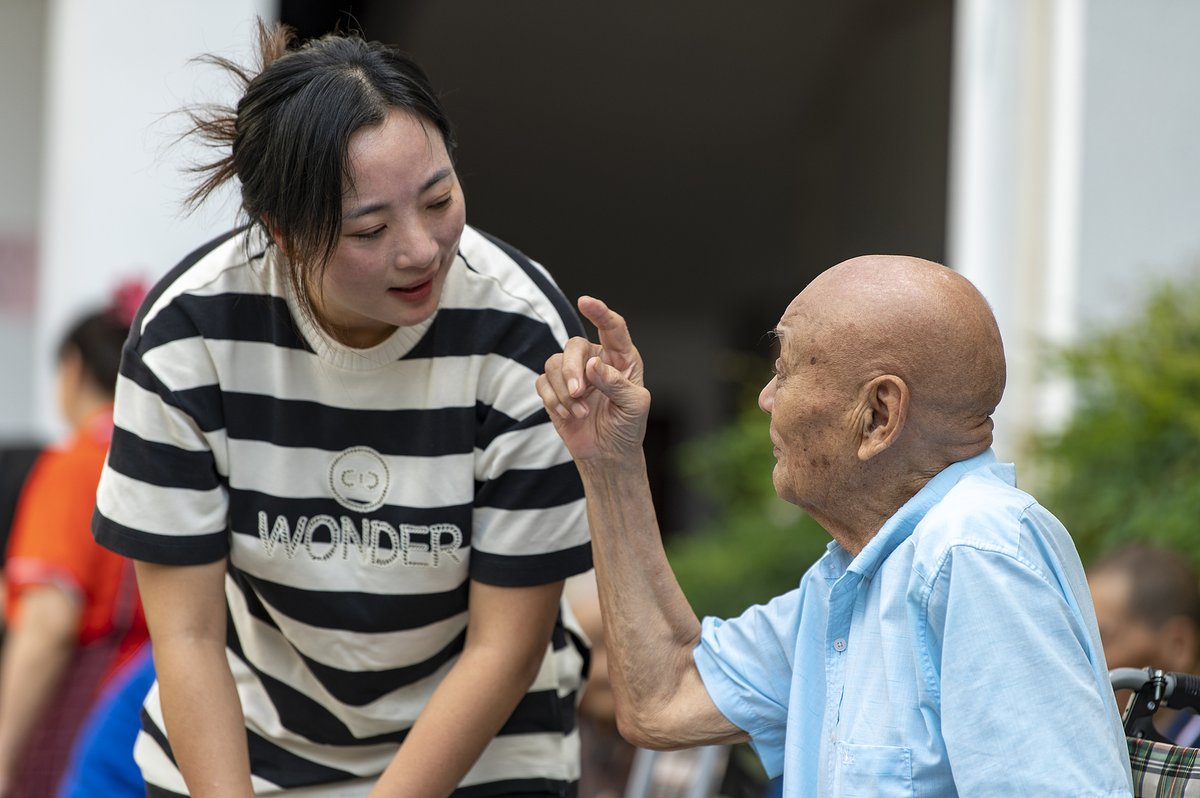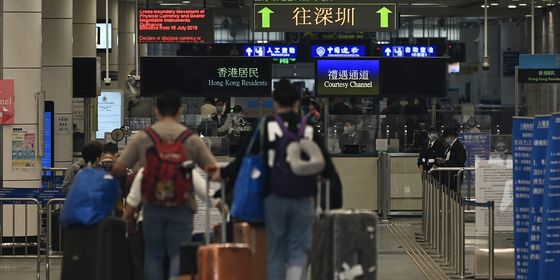A growing industry of memoir ghostwriters is helping China’s seniors preserve their legacies—and boosting the silver economy
Science graduate Lei Gen was searching for part-time work last March. While exploring ghostwriting opportunities, he identified two primary revenue streams: market research reports and business plans. Then, almost accidentally, he stumbled upon a third option that didn’t require specialized expertise—writing memoirs for the elderly.
The Chinese society is aging fast. Citizens between the ages of 50 and 59 are currently the country’s largest demographic cohort. Recent data from the National Bureau of Statistics show that individuals 60 and older represent more than 20 percent of the total population, which is about 297 million people. By 2050, this figure is expected to rise to 480 million. By then, the “silver economy”—economic activities, products, and services catering to people over 50—could potentially account for one-third of the country’s total GDP.
China’s elderly are known to be frugal, but they have shown a willingness to spend on products that give them emotional support, ones that promote health or companionship. Recently, they’ve begun seeking something else—a sense that they had lived a meaningful life.
Read more about elderly lives in China:
- The Future of China’s Elderly Care is Young
- No Respite in Retirement for China's Migrating Elderly
- Golden Connections: How a Chinese Social Media Site Brings Together Seniors
Mo Yanlin, a researcher at the Geriatric Psychology Laboratory of Beijing Normal University, pointed to a “continuity theory,” which suggests that elderly individuals tend to maintain their past lifestyle rather than enter an entirely new phase of life. Writing memoirs perfectly meets this need by creating a connection between their past and present.
And that’s why many are willing to spend a hefty sum hiring ghostwriters to tell their life stories—somewhere between 3,000 and 6,000 yuan for every 10,000 words.
Lei concluded that he’d found a “blue ocean opportunity”—an untapped market, in other words. He jumped right in, and finished three commissions in half a year. His longest memoir came out to 70,000 words.
“Anyone over the age of 65 has witnessed so much,” he says. “I don’t think we’ll see such riveting content from those born in the 1980s and 90s.”
Insider knowledge
In this emerging industry, finding clients is often more important than being an experienced writer.
Song Yuqian (pseudonym), who studied liberal arts, was told by industry insiders to target those with good retirement benefits and a sense of pride in their lives. Working for a symbolic amount, or even free of charge, was also a good strategy to get one’s foot in the door.
She was also advised to introduce herself at places where the elderly socialized, such as travel groups and community activity centers. A business card, a brochure, some sample books, and a few small gifts can go a long way with the seniors. Social media was also a good place to find people, from square dance leaders to funeral planners. There are even online “shops” on e-commerce platforms such as Taobao, Pinduoduo, and Xianyu that offer the service, though the caveat here is that outsourced authors generally only keep a maximum of 60 percent of their earnings.
Ding Longlong, a nursing major from Nanjing and former hospital worker, came across memoir writing not long ago. He had no professional writing experience, but that didn’t matter because he was a competitive candidate in other ways—he was a caregiver for elderlies with disabilities, granting him close access to a potential client pool. He is currently penning the memoir of Zhao Mingcai, whose claim to fame is being a comrade-in-arms to Lei Feng, the national hero who has become a symbol of altruism in Chinese society. Zhao’s family had hired in-home help from the senior care company where Ding works.
Famine, war, and change
Zhao is fond of recalling every detail about Lei Feng: “He was four years my junior. Short guy, but very handsome.” In front of Lei Feng’s tomb, Zhao had vowed to carry on Lei Feng’s legacy. He turned part of his own house into a memorial museum, and once embarked on a 16-hour train odyssey to remote villages to preach about Lei Feng and his values. “Exhausting, but I persevered.”
Reminiscence is a process of emotional release for these seniors, who often get emotional recalling past lives that suddenly seem at reach again.
Zhao Yuxi used to work in media. He started writing memoirs for seniors in 2018, then founded the company “Morning Flowers and Sunsets” in 2021, dedicated to recording life stories. He has since completed over 30 projects, with fees ranging between 10,000 and 100,000 yuan.
Zhao’s impetus to enter this line of work was his grandfather’s passing and the mixed feelings it stirred in him. Zhao was raised by his grandfather, but still found himself largely in the dark about his grandfather’s life long after his death. Two years later, when a friend asked him if he’d be interested in writing a memoir for a retired mechanical technician, Zhao took on the assignment, and everything snowballed from there.
Zhao has come across many veterans and retired policemen reminiscing on the days of their youth, marked by famine, war, conflict, and instability. His prefaces to each memoir typically represent these men’s reflections on China’s transformation during their lifetime. Many have distinct memories of the sound of gunfire and cannons. They recall the silhouette of the high city walls shaping up against the dark night, and how they marched forward, hearing the groans of their injured comrades.
A retired Tibetan police officer often recalls the time he captured a smuggling kingpin and, on the way to Lhasa, found himself in a life-or-death chase with the smuggling gang. A small grocery store owner recalls his many comrades lost to the construction of the Chengdu-Kunming Railway. A retired blue-collar worker reminisces about his days working for the Third Front Construction project that developed industrial and military facilities in the country’s interior during the 60s and 70s, and his own tai chi boxing club he started upon his retirement. An elderly aunt looks back on her marriage and childbearing years as the prelude to her current role of doting grandmother.
Beth Kaplan, who has taught memoir and personal essay writing for 30 years at the University of Toronto School of Continuing Studies, always encourages elderly people to write their life stories in a book format. “As a senior individual, you’ve got plenty of untold stories left in you,” she says. “Writing and placing those on a bookshelf now means that a century later, someone may crack that book open and learn from your legacy.”
Kaplan’s argument carries the promise of a future for these seniors. This is apparent in Kaplan’s memoir writing guide, True to Life: 50 Steps to Help You Tell Your Story. While most of her target audiences in Canada are female retirees with adult children who have formed their own families, Zhao believes that the memoir craze has reached a larger base in China. “Many elderlies carry rather unremarkable lives, and won’t get to enjoy a particularly cushy retirement,” he says. “But they still have the desire and aspiration to write a memoir.” Zhao thinks that commissioning a memoir is no longer a lavish expense. Nowadays, ordinary families may very well be able to afford their relative’s memoir for a very reasonable fee of 10,000 yuan, which should get them 200 pages of a loved one’s life.
A fairy tale rendition of life
A critical challenge every memoirist faces is ensuring the authenticity and accuracy of their stories. What they do not get is guarantees, for memory itself is not reliable, and, more importantly, people always embellish or obscure their stories to present their best selves. In the process of recording a client’s memories, it is likely that holes in the narrative will require clarification that the other party refuses to provide.
“It’s only human to have made mistakes throughout your life, or even just less-than-stellar choices. But that doesn’t mean you want to see them on paper,” Lei Gen explains, even though the subjects themselves might actually be more than happy with those stories.
The customers’ families would sometimes interrupt and stop them from disclosing unpalatable traits or events from their past. Lei points out that concealment and embellishment go hand in hand with his customers all too often. “When they excitedly hype themselves up, there’s not much else for you to dress up during the actual writing stage.”
He recalls a former client getting excited talking about his former unit leader, who allegedly attempted to thwart his transfer application. He says he stood up to his superior, kicked open the door of the room where the guy was playing mahjong, stuck a finger to his nose, and gave him a good scold, followed by an old-fashioned fight. Lei was rather incredulous, but still included the story in the memoir.
“I am sure this was a highlight of his life,” he says. “But subordinates usually couldn’t stick it to their leaders in such a dramatic fashion back then, so I didn’t elaborate or embellish any further.” He also included the story of how two girls from his village competed for his affection and even got into a fight over him. “To be honest, he was probably still bragging. But since he said it, I just wrote it down,” says Lei.
Sometimes, Lei would actively choose to add a bit of embellishment. One of his octogenarian customers confessed to robbing the villagers of food. “It was too harsh a confession for his memoir. After all, it was meant for future generations of his family to read. So I softened things.”
Zhao Yuxi adds that a writer’s job also involves giving meaning to the stories their clients tell. Once a client recalled the scene of his father beating him, Zhao had to jump in and ask, “What did you learn from your father’s actions?” There may not have been any, but Zhao still went for the line of thinking that a disastrous event may turn into a blessing in disguise. It just reads better in print.
Memoirs are less likely to inspire conflict if you only have one source. It can get complicated when several parties get involved, a challenge Lei Gen encountered when one subject’s children pulled in six different family members during the interview stage. Their replies all varied greatly. “The most brilliant narrator is likely to be the lead source of information,” he says, with little regard for ethics. “I go with whichever version of the story fits the tone best.”
At least for him, a harsh but practical rule—whoever pays the bill gets to have their version prevail.
Zhao adds, “Think of this as your wedding portrait. You’re supposed to wear a full face of heavy make-up for those, right? There’ll be no complaints against the make-up artist if the result is good. The same goes for us. At the end of the day, we are service providers fulfilling the client’s wishes. Our ultimate goal is their satisfaction, and so we kind of play a supporting role as they spin fairy-tale versions of their lives.”
AI-supported assembly line
With more orders coming in, Zhao and his staff have refined a division of labor to maximize efficiency in memoir productions. “We have an industrialized model,” says Zhao. Currently, they divide each assignment into two parts, interview, and writing, with each member of the team taking on a different section of the work. Interviews are scheduled once a week for a couple of hours, and usually tackle one chapter of the subject’s life at a time. Memoirs with a word count of about 50,000 words tend to require 10 hours of interviews, which is best tackled by those with media experience, as they know to redirect the focus of an otherwise rambling narrator. All conversations are recorded.
Writers do need to have a little gift with words. They need to work with the interviewer and draft from their recordings. Zhao is quick to break down the numbers: “We could tackle a maximum of 10 projects simultaneously in a five-day work week. Every day we carry out one interview in the morning and another in the afternoon. One interviewer could potentially be working with 10 writers at the same time.”
Needless to say, some customers prefer to take their time for the sake of quality, as was the case for one of Hu Xiaosha’s recent clients, a wealthy retired businessman born in the 60s who wants Hu to write his memoir over the course of two years. Each week, he would gather with family and friends to reminisce about a particular year of his life, collect related materials, and then spend half a day sharing that year’s story with Hu.
But efficiency is vital in the business, says Lei Gen, who readily acknowledges the support he seeks from AI tools such as ChatGPT and Claude. The AI assistants come in handy in everything from transcription and drafting the first few chapters. The AI can easily optimize outlines and list relevant events in chronological order. “It would otherwise be a ton of work.”
But Lei does give a disclaimer that AI’s role is still auxiliary. “AI has poor memory abilities, which means lots of redundant, machine-like content that abuses logical conjunctions for something that is ultimately a story for your descendants.” Additionally, AI suffers from a lack of colloquial expressions, resulting in an uptight voice that betrays a lack of understanding of context. People rely on sarcasm for humor all the time, but many of those are lost on AI assistants.
Lei remains acutely aware of AI’s limitations. “It can only take on about 30 percent of the workload.”
Zhao is no longer using AI for his work, having found it dreadfully inadequate at grasping subtle semantics. When one of his clients recalled food scarcity in his youth, being only able to cook a limited variety of ingredients in every possible way, AI misunderstood this as a positive accomplishment of the subject.
Most notably, AI is notorious for making up stories with remarks the subject did not provide, which can sometimes anger the client. “They’ll think you’re writing utter nonsense.”
Emotional support
To a greater or lesser extent, there is overlap between hired memoirists and psychological counselors. In his previous job as a nurse, Ding Longlong conversed with his fair share of disabled and chatty seniors. They felt much better after sorting out their lives with the help of a patient listener by their side. The Aging Lab of Beijing Normal University highlighted in a recent article that this is an important form of psychotherapy for the elderly, resulting in improved self-efficiency, self-esteem, and satisfaction with their lives.
Zhao Yuxi is often commissioned by the children of his subjects, driven by a sense of filial piety and the desire to preserve their loved ones’ memories after they are gone. “Otherwise, they may not get to keep anything else by means of a legacy from their elders.”
Zhao explains that because many senior citizens are not good at using even their mobile phones, they’re left out of our current content creation trend. “They commission their memoirs as their own way to announce their existence to the world. They, too, were once here.”
Hu Xiaosha noticed an uptick in business after the Covid-19 epidemic. “I believe it had a great impact on our elders, with their heightened awareness of life and death. They have bottled up all these stories to pass onto their children, so memoirs serve a purpose here.” Hu recently met with a very special client, a lady who used to work as an editor for a Beijing-based publishing house. Her daughter, a healthcare professional who struggled with mental health, had died by suicide at only 30 years old. Seven days after the tragedy, this bereaved mother found Hu and commissioned her to write her daughter’s posthumous memoir. “She would have been perfectly capable of writing it herself,” Hu says. “However, she was in way too much pain for the task.” Hu found herself playing the role of both writer and comforting companion.
Ding sees potential in expanding the scope of the memoir genre to include sub-genres like family narratives, love and marriage stories, accounts of life at schools for elderlies, and even growth diaries of beloved grandchildren. The industry is bound to blend well with artificial intelligence and artificial reality. Imagine being able to check old photographs brought to life just by scanning a QR code in the memoir. Or maybe you would prefer a video featuring your relative, interacting with you now and forever.
“The industry is still in its infancy,” Zhao says. “But I think we’ll reach new heights in the future. Memoir ghostwriting will evolve into an industry similar to wedding photography in terms of size.”
Written by Chen Mo (陈默)
This story was originally published in Chinese. It has been translated, edited, and republished with the author’s permission.





